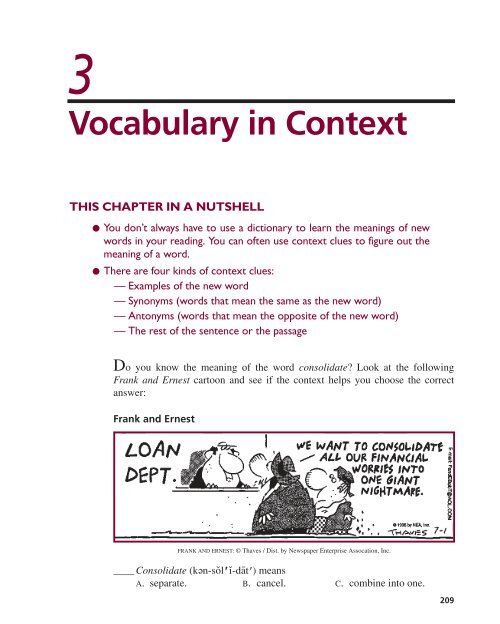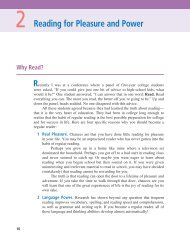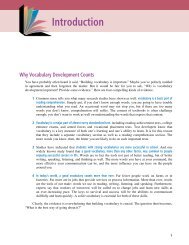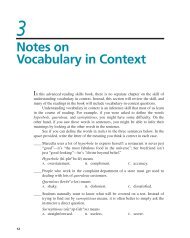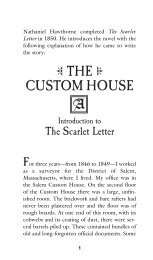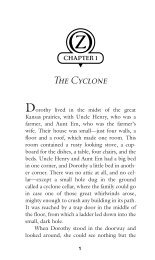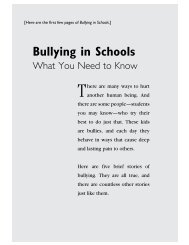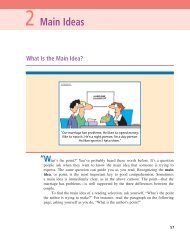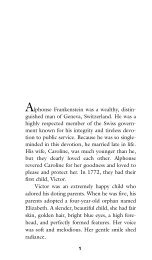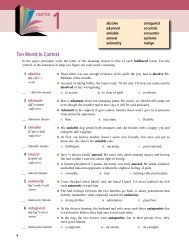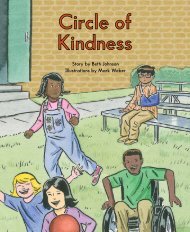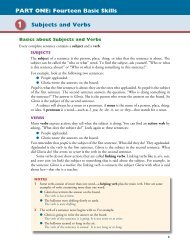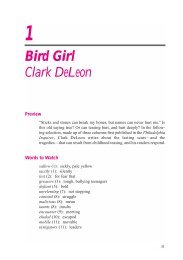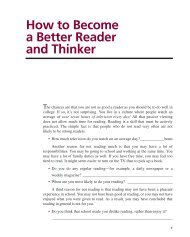Vocabulary in Context - Townsend Press
Vocabulary in Context - Townsend Press
Vocabulary in Context - Townsend Press
Create successful ePaper yourself
Turn your PDF publications into a flip-book with our unique Google optimized e-Paper software.
3<br />
<strong>Vocabulary</strong> <strong>in</strong> <strong>Context</strong><br />
THIS CHAPTER IN A NUTSHELL<br />
● You don’t always have to use a dictionary to learn the mean<strong>in</strong>gs of new<br />
words <strong>in</strong> your read<strong>in</strong>g. You can often use context clues to figure out the<br />
mean<strong>in</strong>g of a word.<br />
● There are four k<strong>in</strong>ds of context clues:<br />
— Examples of the new word<br />
— Synonyms (words that mean the same as the new word)<br />
— Antonyms (words that mean the opposite of the new word)<br />
— The rest of the sentence or the passage<br />
Do you know the mean<strong>in</strong>g of the word consolidate? Look at the follow<strong>in</strong>g<br />
Frank and Ernest cartoon and see if the context helps you choose the correct<br />
answer:<br />
Frank and Ernest<br />
FRANK AND ERNEST: © Thaves / Dist. by Newspaper Enterprise Assocation, Inc.<br />
____ Consolidate (k®n-s≤l'μ-dΩt') means<br />
A. separate. B. cancel. C. comb<strong>in</strong>e <strong>in</strong>to one.<br />
209
210 TEN STEPS TO COLLEGE READING<br />
Frank and Ernest are seek<strong>in</strong>g a large s<strong>in</strong>gle loan for their f<strong>in</strong>ancial worries.<br />
(Of course, the joke is that all their small debts will now be replaced by “one<br />
giant nightmare” of a loan.) The context—the words surround<strong>in</strong>g the unfamiliar<br />
word—tells us that consolidate means “comb<strong>in</strong>e <strong>in</strong>to one.” In this chapter, you<br />
will learn how to use context to figure out the mean<strong>in</strong>gs of words.<br />
UNDERSTANDING VOCABULARY IN CONTEXT<br />
Do you know the mean<strong>in</strong>g of the word queries? How about the word tedious?<br />
Or the word transmit?<br />
You may be hav<strong>in</strong>g trouble com<strong>in</strong>g up with the mean<strong>in</strong>gs of these words.<br />
However, you will be more likely to know what they mean when you see them<br />
<strong>in</strong> complete sentences. Read each sentence below and see if you can understand<br />
the mean<strong>in</strong>g of the word <strong>in</strong> italics. In the space provided, write the letter of the<br />
mean<strong>in</strong>g you th<strong>in</strong>k is correct. Then read the explanation.<br />
_____ B<br />
1. Julia was nervous about answer<strong>in</strong>g the detective’s queries. Why was<br />
he ask<strong>in</strong>g so many questions, anyway?<br />
Queries (kwîr'∂z) are<br />
A. charges. B. questions. C. statements of fact.<br />
_____ C 2. Most of my history teacher’s lectures were tedious, but the one about<br />
what really happened on Paul Revere’s famous ride was very <strong>in</strong>terest<strong>in</strong>g.<br />
Tedious (t∂'d∂-®s) means<br />
A. <strong>in</strong>terest<strong>in</strong>g. B. long. C. bor<strong>in</strong>g.<br />
_____ A 3. Mosquitoes transmit sleep<strong>in</strong>g sickness through bit<strong>in</strong>g.<br />
Transmit (tr√ns-mμt') means<br />
A. spread. B. enjoy. C. cure.<br />
Explanation:<br />
In each sentence above, the context provides clues to the word’s mean<strong>in</strong>g. You<br />
may have guessed from the context that queries means “questions,” that tedious<br />
means “bor<strong>in</strong>g,” and that transmit means to “spread.”<br />
Us<strong>in</strong>g context clues to understand the mean<strong>in</strong>g of unfamiliar words will<br />
help you <strong>in</strong> two ways:<br />
1 It will save you time when read<strong>in</strong>g. You will not have to stop to look up<br />
words <strong>in</strong> the dictionary. (Of course, you won’t always be able to understand a<br />
word from its context, so you should have a dictionary nearby as you read.)<br />
2 It will improve your “work<strong>in</strong>g vocabulary”—words you recognize as you<br />
read and will eventually be able to use when you speak and write.
TYPES OF CONTEXT CLUES<br />
1 Examples<br />
Here are four common types of context clues:<br />
1 Examples<br />
2 Synonyms<br />
3 Antonyms<br />
4 General Sense of the Sentence or Passage<br />
In the follow<strong>in</strong>g sections, you will read about and practice each type of<br />
clue. The practices will sharpen your skills <strong>in</strong> us<strong>in</strong>g context clues and help you<br />
add new words to your vocabulary.<br />
Remember not to use a dictionary for these practices. Their purpose is to<br />
help you develop the skill of figur<strong>in</strong>g out what words mean without us<strong>in</strong>g a<br />
dictionary. Pronunciations are provided <strong>in</strong> parentheses for the words, and a<br />
guide to pronunciation is on page 551.<br />
An unfamiliar word may appear with examples that reveal what the word means.<br />
Look at the cartoon below and see if the examples help you choose the correct<br />
mean<strong>in</strong>g of the word commitment:<br />
____ Commitment (k®-mμt'm®nt) means<br />
VOCABULARY IN CONTEXT 211<br />
“You have a 30-year mortgage, a 5-year car lease, and a<br />
lifetime gym membership . . . but you’re<br />
afraid of commitment?”<br />
A. a promise to do someth<strong>in</strong>g. C. an op<strong>in</strong>ion about someth<strong>in</strong>g.<br />
B. an opportunity for someth<strong>in</strong>g.
212 TEN STEPS TO COLLEGE READING<br />
The three examples of commitment—a 30-year mortgage, a 5-year car lease,<br />
and a lifetime gym membership—help you understand that commitment means<br />
“a promise to do someth<strong>in</strong>g.”<br />
<br />
Check Your Understand<strong>in</strong>g<br />
Now read the items that follow. An italicized word <strong>in</strong> each sentence is followed<br />
by examples that serve as context clues for that word. These examples, which<br />
are boldfaced, will help you figure out the mean<strong>in</strong>g of each word. On each l<strong>in</strong>e,<br />
write the letter of the answer you th<strong>in</strong>k is correct.<br />
Note that examples are often <strong>in</strong>troduced with signal words and phrases like<br />
for example, for <strong>in</strong>stance, <strong>in</strong>clud<strong>in</strong>g, and such as.<br />
_____ A 1. Assets (√s'ƒts') such as good health, a lov<strong>in</strong>g family, and an<br />
enjoyable job make life reward<strong>in</strong>g.<br />
Assets are<br />
A. th<strong>in</strong>gs of value. B. rewards on the job. C. helpful people.<br />
H<strong>in</strong>t: Remember that <strong>in</strong> the exercises <strong>in</strong> this chapter, you can<br />
<strong>in</strong>sert <strong>in</strong>to each sentence the word you th<strong>in</strong>k is the answer. For<br />
example, substitute th<strong>in</strong>gs of value, rewards on the job, or helpful<br />
people <strong>in</strong>to sentence 1 <strong>in</strong> place of assets to see which one fits.<br />
_____ B<br />
2. A coyote’s prey (prΩ) <strong>in</strong>cludes squirrels, rabbits, and mice.<br />
Prey means<br />
A. friends. B. victims. C. replacement.<br />
_____ A 3. The sports car had defects (d∂'fƒkts')—for example, a dented fender<br />
and torn seats—but I didn’t care. I had wanted a Corvette for years,<br />
and I was go<strong>in</strong>g to buy it.<br />
Defects are<br />
Explanation:<br />
A. faults. B. out-of-date features. C. foreign qualities.<br />
1. The correct answer is A. The examples given—good health, a lov<strong>in</strong>g<br />
family, and a job you enjoy—show that assets are “th<strong>in</strong>gs of value.”<br />
2. The correct answer is B. The examples—squirrels, rabbits, and mice—<br />
reveal that prey are “victims.”<br />
3. The correct answer is A. The examples—a dented fender and torn seats—<br />
show that defects are “faults.”
➣<br />
Practice 1: Examples<br />
VOCABULARY IN CONTEXT 213<br />
Read each item below and then do two th<strong>in</strong>gs:<br />
1. Underl<strong>in</strong>e the examples that suggest the mean<strong>in</strong>g of the word <strong>in</strong> italics.<br />
2. Write the letter of the word’s mean<strong>in</strong>g on the answer l<strong>in</strong>e.<br />
_____ A 1. We often communicate what we mean by us<strong>in</strong>g gestures such as the<br />
The examples, thumbs-up sign, hands on the hips, and a shrug of the shoulders.<br />
signaled by such as,<br />
are of motions of the<br />
body.<br />
Gestures (jƒs'ch®rs) are<br />
A. motions of the body. B. good feel<strong>in</strong>gs. C. hand signals.<br />
_____ C 2. Newspaper reporters have been fired for fictitious report<strong>in</strong>g that<br />
<strong>in</strong>cluded quotations which were never said and events that never<br />
occurred.<br />
The examples, signaled by <strong>in</strong>cluded,<br />
Fictitious (fμk-tμsh'®s) means<br />
are of th<strong>in</strong>gs that are not real.<br />
A. true-life. B. unknown. C. not real.<br />
_____ A 3. Obnoxious behavior <strong>in</strong> a movie theater—for <strong>in</strong>stance, burp<strong>in</strong>g, loud<br />
The examples, talk<strong>in</strong>g, or play<strong>in</strong>g around—is considered childish by most people.<br />
signaled by for<br />
<strong>in</strong>stance, are of Obnoxious (≤b-n≤k'sh®s) means<br />
unpleasant behavior. A. very unpleasant. B. acceptable. C. funny.<br />
_____ C 4. For better health and a longer life, doctors recommend wholesome<br />
The examples,<br />
signaled by<br />
<strong>in</strong>clud<strong>in</strong>g, are of<br />
activities, <strong>in</strong>clud<strong>in</strong>g exercis<strong>in</strong>g daily and eat<strong>in</strong>g nutritious foods.<br />
Wholesome (h˚l's®m) means<br />
healthy activities.<br />
A. bor<strong>in</strong>g. B. skillful. C. healthy.<br />
_____ B 5. Examples of distractions that always seem to occur dur<strong>in</strong>g an<br />
important test <strong>in</strong>clude cough<strong>in</strong>g, sigh<strong>in</strong>g, and scrap<strong>in</strong>g of chairs.<br />
Distractions (dμ-str√kt'sh®nz) are th<strong>in</strong>gs that<br />
A. are friendly. B. take away C. <strong>in</strong>crease your<br />
your attention. ability to perform.<br />
2 Synonyms<br />
The examples, signaled by Examples . . . <strong>in</strong>clude,<br />
are of th<strong>in</strong>gs that take away your attention dur<strong>in</strong>g a test.<br />
<strong>Context</strong> clues are often found <strong>in</strong> the form of synonyms: one or more words that<br />
mean the same or almost the same as the unknown word. Look aga<strong>in</strong> at the<br />
sentences on page 210: “Julia was nervous about answer<strong>in</strong>g the detective’s<br />
queries. Why was he ask<strong>in</strong>g so many questions, anyway?” Here the synonym<br />
“questions” tells you the mean<strong>in</strong>g of queries.
214 TEN STEPS TO COLLEGE READING<br />
Now look at the cartoon below about a boy talk<strong>in</strong>g to his mother.<br />
Notice that the synonym for humiliate—expressed <strong>in</strong> the words of the young<br />
man who says “I feel worthless enough already”—helps you understand that<br />
humiliate (hyapple'mμl'∂-Ωt') means “to make feel ashamed.”<br />
<br />
Check Your Understand<strong>in</strong>g<br />
“Don’t humiliate me, Mom.<br />
I feel worthless enough already.”<br />
Each item below conta<strong>in</strong>s a word or phrase that is a synonym of the italicized<br />
word. Underl<strong>in</strong>e the synonym <strong>in</strong> each sentence. Then read the explanation that<br />
follows.<br />
1. Hal was a mediocre (m∂'d∂-˚'k®r) student. He was an average baseball<br />
player, as well.<br />
2. It is hard to believe that my millionaire cous<strong>in</strong> was once <strong>in</strong>digent<br />
(μn'dμ-j®nt), so poor that he walked the streets without know<strong>in</strong>g<br />
where his next meal would come from.<br />
3. Most companies have a regulation (rƒg'y®-lΩ'sh®n) allow<strong>in</strong>g new<br />
mothers to take three months off from work. Some firms also have a<br />
rule allow<strong>in</strong>g fathers the same time off.
➣<br />
Explanation:<br />
3 Antonyms<br />
VOCABULARY IN CONTEXT 215<br />
In each sentence, the synonym probably helped you understand the mean<strong>in</strong>g of<br />
the word <strong>in</strong> italics:<br />
1. Someone who is mediocre at someth<strong>in</strong>g is “average.”<br />
2. Someone who is <strong>in</strong>digent is “poor.”<br />
3. A regulation is a “rule.”<br />
Practice 2: Synonyms<br />
Each item below <strong>in</strong>cludes a synonym of the italicized word. Write each<br />
synonym <strong>in</strong> the space provided.<br />
admit<br />
__________________ 1. Some people hate to admit an error. My boss, for<br />
<strong>in</strong>stance, will never concede (k®n-s∂d') that he might<br />
be wrong.<br />
The boss will never admit that<br />
he might be wrong.<br />
__________________ unwill<strong>in</strong>g 2. You may be reluctant (rμ-l∫k't®nt) to give a speech<br />
now, but the more speak<strong>in</strong>g practice you get, the less<br />
unwill<strong>in</strong>g you will be. You may be unwill<strong>in</strong>g to<br />
give a speech now.<br />
__________________ ridiculous 3. The absurd (®b-sûrd') idea that people from outer<br />
space live among us is as ridiculous as the belief that<br />
the Earth is flat. The idea that people from outer space<br />
live among us is ridiculous.<br />
__________________ fearful 4. Students are often apprehensive (√p'rμ-hƒn'sμv) of<br />
f<strong>in</strong>al exams, but with the right study skills, they don’t<br />
have to be fearful.<br />
Students are often fearful of<br />
f<strong>in</strong>al exams.<br />
__________________ false idea 5. The belief that you can dr<strong>in</strong>k and then drive safely is<br />
a fallacy (f√l'®-s∂); unfortunately, this false idea is<br />
held by many people. The idea that you can dr<strong>in</strong>k and<br />
then drive safely is a false idea.<br />
Antonyms—words and phrases that mean the opposite of a word—are also<br />
useful as context clues. For example, soft is the opposite of hard, and worried is<br />
the opposite of relieved. Antonyms are often signaled by words such as unlike,<br />
but, however, <strong>in</strong>stead of, <strong>in</strong> contrast, or on the other hand.<br />
Look aga<strong>in</strong> at the sentence on page 210: “Most of my history teacher’s<br />
lectures were tedious, but the one about what really happened on Paul Revere’s<br />
famous ride was very <strong>in</strong>terest<strong>in</strong>g.” Here the word but helps suggest that tedious<br />
must be the opposite of <strong>in</strong>terest<strong>in</strong>g.
216 TEN STEPS TO COLLEGE READING<br />
Look also at the cartoon below about a married couple do<strong>in</strong>g household<br />
chores:<br />
Notice that the antonym “noth<strong>in</strong>g to do” helps you figure out that overwhelmed<br />
(˚'v®r-hwƒlmd') must mean “hav<strong>in</strong>g too much to do.”<br />
<br />
“Before the kids, we had noth<strong>in</strong>g to do.<br />
Now we’re overwhelmed.”<br />
Check Your Understand<strong>in</strong>g<br />
In each of the follow<strong>in</strong>g sentences, underl<strong>in</strong>e the word or phrase that means the<br />
opposite of the italicized word. Then, on the answer l<strong>in</strong>e, write the letter of the<br />
mean<strong>in</strong>g of the italicized word. F<strong>in</strong>ally, read the explanation that follows.<br />
_____ B 1. The adverse weather conditions forced us to stay <strong>in</strong>side for most of<br />
our vacation. The day the weather f<strong>in</strong>ally turned nice, we had to<br />
leave.<br />
Adverse (√d-vûrs') means<br />
A. nice. B. bad. C. summer.<br />
_____ A 2. I thought it was difficult to ascend the mounta<strong>in</strong>, but I discovered that<br />
climb<strong>in</strong>g down it was even worse.<br />
Ascend (®-sƒnd')means<br />
A. climb up. B. walk around. C. climb down.<br />
_____ C<br />
3. After years of defy<strong>in</strong>g my parents, I decided life might be better if I<br />
tried agree<strong>in</strong>g with them once <strong>in</strong> a while.<br />
Defy<strong>in</strong>g (dμ-fΔ'yμng) means<br />
A. avoid<strong>in</strong>g. B. obey<strong>in</strong>g. C. oppos<strong>in</strong>g.
➣<br />
Explanation:<br />
VOCABULARY IN CONTEXT 217<br />
1. The correct answer is B. Adverse weather conditions are the opposite of<br />
“nice” ones—they are bad.<br />
2. The correct answer is A. To ascend is the opposite of “climb<strong>in</strong>g down”—<br />
when you ascend, you climb up.<br />
3. The right answer is C. Defy<strong>in</strong>g one’s parents is the opposite of “agree<strong>in</strong>g<br />
with them.” When you defy people, you oppose what they say.<br />
Practice 3: Antonyms<br />
Each item below <strong>in</strong>cludes a word or phrase that is an antonym of the italicized<br />
word. Underl<strong>in</strong>e each of those antonyms. Then, on the l<strong>in</strong>e, write the letter of the<br />
mean<strong>in</strong>g of the italicized word.<br />
_____ C 1. Your science project is much more elaborate than m<strong>in</strong>e. In fact, m<strong>in</strong>e<br />
looks very simple compared with yours.<br />
An elaborate project is the<br />
H<strong>in</strong>t: What would be the opposite of elaborate? opposite of a “very simple”<br />
Elaborate (μ-l√b'®r-μt) means<br />
one. It is complicated.<br />
A. pla<strong>in</strong>. B. large. C. complicated.<br />
_____ A 2. Gordon’s family worried that he would rema<strong>in</strong> an obscure author all<br />
An obscure author is his life. However, he believed that someday he would be famous.<br />
the opposite of a<br />
“famous” one—<strong>in</strong> Obscure (≤b-sky¯r') means<br />
other words, unknown. A. unknown. B. well-known. C. good.<br />
_____ B 3. The attorney <strong>in</strong>troduced facts she felt were relevant to the case. But<br />
the judge said the facts were unrelated to the trial. Facts that are relevant<br />
are the opposite of facts that are<br />
Relevant (rƒl'®-v®nt) means “unrelated.” They are related to the case.<br />
A. legal. B. related. C. known.<br />
_____ B 4. When provid<strong>in</strong>g directions, give the steps <strong>in</strong> sequence. If they are out<br />
Steps that are <strong>in</strong> of order, those try<strong>in</strong>g to follow the directions will become confused.<br />
sequence are the<br />
opposite of steps that In sequence (s∂'kw®ns) means<br />
are “out of order.” A. all at once. B. <strong>in</strong> order. C. <strong>in</strong> a confus<strong>in</strong>g way.<br />
They are <strong>in</strong> order.<br />
_____ C 5. The teacher commended two students on the outstand<strong>in</strong>g work they<br />
were do<strong>in</strong>g. Then he criticized the rest of class for do<strong>in</strong>g so poorly.<br />
Commended (k®-mƒnd'ed) means<br />
A. blamed. B. graded. C. praised.<br />
When the teacher commended the two students, he did the opposite of<br />
what he did when he “criticized” the rest of the class: he praised them.
218 TEN STEPS TO COLLEGE READING<br />
4 General Sense of the Sentence or Passage<br />
Often, the context of a new word conta<strong>in</strong>s no examples, synonyms, or antonyms.<br />
In such cases, you must do a bit of detective work and try to make a guess based<br />
on any clues provided.<br />
Look at the cartoon below about a job <strong>in</strong>terview.<br />
The glow<strong>in</strong>g reference (from the job applicant’s mother!) helps you realize<br />
that impressive (μm-prƒs'μv) means “very favorable.”<br />
<br />
“Allen is an <strong>in</strong>credible, wonderful, fun, generous, excit<strong>in</strong>g,<br />
k<strong>in</strong>d, lov<strong>in</strong>g, brilliant, very special human be<strong>in</strong>g.<br />
This personal reference from your mother is quite impressive.”<br />
Check Your Understand<strong>in</strong>g<br />
In each sentence below, look for general clues to the mean<strong>in</strong>g of the word <strong>in</strong><br />
italics. Then write the letter of the answer you feel is the mean<strong>in</strong>g of the<br />
italicized word.<br />
_____ B 1. Elena thought she had ample time to review her notes before the<br />
afternoon exam. Then she discovered her watch was <strong>in</strong>correct—she<br />
was actually late for the test!<br />
Ample (√m'p®l) means<br />
A. no. B. plenty of. C. little.<br />
_____ A<br />
2. At the animal shelter, Rita fell <strong>in</strong> love with a poodle, but Dan couldn’t<br />
resist a collie. So they felt that there was no alternative but to keep<br />
both animals.<br />
An alternative (âl-tûr'n®-tμv) is a<br />
A. choice. B. reason. C. mystery.
➣<br />
_____ B 3. As a consequence of his bad report card, my brother could not watch<br />
TV until his grades improved.<br />
A consequence (k≤n'sμ-kwƒns') is a<br />
A. right. B. result. C. chance.<br />
Explanation:<br />
VOCABULARY IN CONTEXT 219<br />
1. The correct answer is B. Ample means “plenty of.” Rita mistakenly thought<br />
she had plenty of time to th<strong>in</strong>k about the exam.<br />
2. The right answer is A. An alternative is a “choice.” Rita and Dan felt they<br />
had no choice but to take both dogs home.<br />
3. The correct answer is B. A consequence is a “result.” The result of the<br />
brother’s bad report card was not be<strong>in</strong>g able to watch TV until his teachers<br />
reported that he had improved.<br />
Practice 4: General Sense of the Passage<br />
Figure out the mean<strong>in</strong>g of the word <strong>in</strong> italics by look<strong>in</strong>g for general clues. Then,<br />
on the l<strong>in</strong>e, write the letter of the mean<strong>in</strong>g you th<strong>in</strong>k is correct.<br />
_____ B 1. My brother felt it would be futile to try to make the basketball team.<br />
If the other players The other players were all at least eight <strong>in</strong>ches taller than he was.<br />
are all at least eight<br />
<strong>in</strong>ches taller, it would Futile (fyapplet'l) means<br />
seem useless to try to A. easy. B. useless. C. expensive.<br />
make the team.<br />
_____ A 2. The impact of the crash was so great that you couldn’t tell the make<br />
of either car. Both were totally destroyed. If both cars were totally<br />
destroyed, the force of the crash must have<br />
Impact (μm'p√kt) means<br />
been great.<br />
A. force. B. time. C. place.<br />
_____ C 3. The young eagle was clearly a novice at fly<strong>in</strong>g. As he tried to land, he<br />
If the young eagle got himself caught <strong>in</strong> a thornbush.<br />
got caught <strong>in</strong> a<br />
thornbush, he must A novice (n≤v'μs) is a<br />
have been a beg<strong>in</strong>ner A. bird. B. success. C. beg<strong>in</strong>ner.<br />
at fly<strong>in</strong>g.<br />
_____ B 4. At a party given by a company for its clients, employees are expected<br />
to m<strong>in</strong>gle with the guests to make the guests feel more comfortable.<br />
M<strong>in</strong>gle (mμng'g®l) with means<br />
A. bother. B. mix with. C. sell th<strong>in</strong>gs to.<br />
For the outside guests to feel more comfortable at<br />
the company party, the employees would need to<br />
mix with them.
220 TEN STEPS TO COLLEGE READING<br />
_____ B 5. Big band music was popular dur<strong>in</strong>g the 1940s. It then disappeared<br />
from the music scene, but has been revived <strong>in</strong> recent years.<br />
Revived (rμ-vΔvd') means<br />
A. lost. B. brought back to life. C. destroyed.<br />
If big band music disappeared after the 1940s, it must<br />
have been brought back to life <strong>in</strong> recent years.<br />
An Important Po<strong>in</strong>t about Textbook Def<strong>in</strong>itions<br />
You don’t always have to use context clues or the dictionary to f<strong>in</strong>d def<strong>in</strong>itions.<br />
Very often, textbook authors provide def<strong>in</strong>itions of important terms. They<br />
usually follow a def<strong>in</strong>ition with one or more examples to to make sure that you<br />
understand the word be<strong>in</strong>g def<strong>in</strong>ed.<br />
Here is a short textbook passage that <strong>in</strong>cludes a def<strong>in</strong>ition and an example.<br />
Note that the term to be def<strong>in</strong>ed is set off <strong>in</strong> boldface type, and the def<strong>in</strong>ition<br />
then follows.<br />
1 Phobias are fears that are out of proportion to the actual danger <strong>in</strong> a<br />
situation. 2 Some people, for example, have a fear of rid<strong>in</strong>g <strong>in</strong> elevators.<br />
3 But there is almost no chance that a cable could break and that the elevator<br />
would suddenly plunge to the ground. 4 Other people may have a phobia<br />
about spiders, dogs, driv<strong>in</strong>g over a bridge, or be<strong>in</strong>g trapped <strong>in</strong> a conf<strong>in</strong>ed<br />
space. 5 In all such cases, there is an unreasonable desire to avoid the feared<br />
activity or object.<br />
Textbook authors, then, often do more than provide context clues: they set<br />
off their def<strong>in</strong>itions <strong>in</strong> italic or boldface type, as above. When they take the time<br />
to def<strong>in</strong>e and give examples of a term, you should assume that the material is<br />
important enough to learn.<br />
More about textbook def<strong>in</strong>itions and examples appears on pages 374–376<br />
<strong>in</strong> the “Signal Words II” chapter.
CHAPTER REVIEW<br />
In this chapter, you learned the follow<strong>in</strong>g:<br />
<br />
VOCABULARY IN CONTEXT 221<br />
• To save time when read<strong>in</strong>g, you should try to figure out the mean<strong>in</strong>gs of<br />
unfamiliar words. You can do so by look<strong>in</strong>g at their context—the words<br />
surround<strong>in</strong>g them.<br />
• There are four k<strong>in</strong>ds of context clues: examples (marked by words like<br />
for example, for <strong>in</strong>stance, <strong>in</strong>clud<strong>in</strong>g, and such as); synonyms (words that<br />
mean the same as unknown words); antonyms (words that mean the<br />
opposite of unknown words); and general sense of the sentence (clues<br />
<strong>in</strong> the sentence or surround<strong>in</strong>g sentences about what words might mean).<br />
• Textbook authors typically set off important words <strong>in</strong> italic or boldface<br />
type and def<strong>in</strong>e those words for you, often provid<strong>in</strong>g examples as well.<br />
The next chapter—Chapter 4—will <strong>in</strong>troduce you to the most important of all<br />
comprehension skills, f<strong>in</strong>d<strong>in</strong>g the ma<strong>in</strong> idea.<br />
On the Web: If you are us<strong>in</strong>g this book <strong>in</strong> class, you can visit our<br />
website for additional practice <strong>in</strong> understand<strong>in</strong>g vocabulary <strong>in</strong><br />
context. Go to www.townsendpress.com and click on “Onl<strong>in</strong>e<br />
Exercises.”
222 TEN STEPS TO COLLEGE READING<br />
➤<br />
Review Test 1<br />
To review what you’ve learned <strong>in</strong> this chapter, answer the follow<strong>in</strong>g questions<br />
by writ<strong>in</strong>g the letter of each correct answer.<br />
_____ C 1. The context of a word is<br />
A. its mean<strong>in</strong>g.<br />
B. its opposite.<br />
C. the words around it.<br />
_____ A 2. Which type of context clue often follows signal words like <strong>in</strong>clud<strong>in</strong>g,<br />
such as, and for <strong>in</strong>stance?<br />
A. Example<br />
See pages 211–212.<br />
B. Synonym<br />
C. Antonym<br />
_____ C 3. In the sentence below, which type of context clue is provided for the<br />
italicized word?<br />
A. Example<br />
B. Synonym<br />
C. Antonym<br />
See page 210.<br />
The word but normally signals an antonym clue.<br />
Here, the word strict means the opposite of lenient.<br />
Students often prefer a lenient teacher to a strict one, but they may<br />
learn more from the strict teacher.<br />
_____ A 4. Often, when textbook authors <strong>in</strong>troduce a new word, they provide a<br />
def<strong>in</strong>ition and help make the mean<strong>in</strong>g of the word clear by <strong>in</strong>clud<strong>in</strong>g<br />
one or more<br />
A. examples.<br />
See page 220.<br />
B. synonyms.<br />
C. antonyms.
➤<br />
Review Test 2<br />
VOCABULARY IN CONTEXT 223<br />
A. Look at the cartoon below and then answer the question that follows.<br />
Antonym clue: Cope<br />
means the opposite of<br />
“Why do I struggle so much and you cope so well?”<br />
struggle, so it means<br />
“deal effectively.”<br />
Also, the picture of<br />
the man _____ A 1. Us<strong>in</strong>g the context clues <strong>in</strong> the cartoon, write the letter of the best<br />
float<strong>in</strong>g on<br />
the cloud suggests he mean<strong>in</strong>g of cope (k˚p) <strong>in</strong> the space provided.<br />
is deal<strong>in</strong>g effectively A. deal effectively B. fail to relate C. try harder<br />
with life.<br />
B. Us<strong>in</strong>g context clues for help, write the letter of the best mean<strong>in</strong>g for each<br />
italicized word.<br />
_____ C 2. Judges are supposed to be impartial, but the judge <strong>in</strong> the trial didn’t<br />
seem fair to me.<br />
Synonym clue: The judge is supposed to be fair.<br />
Impartial (μm-pär'sh®l) means<br />
Note that, <strong>in</strong> this sentence,<br />
but does not signal an antonym.<br />
A. not listen<strong>in</strong>g. B. not honest. C. not favor<strong>in</strong>g one<br />
side or the other.<br />
Example<br />
_____ B<br />
clue: The 3. After stand<strong>in</strong>g empty for fifteen years, the old mansion had<br />
second sentence gives deteriorated. The wood was decay<strong>in</strong>g, the plaster was peel<strong>in</strong>g, and<br />
three examples of most of the w<strong>in</strong>dows had been broken.<br />
ways the house is<br />
becom<strong>in</strong>g worse: the Deteriorate (dμ-tîr'∂-®-rΩt') means to<br />
decay<strong>in</strong>g wood, A. become older. B. become worse.<br />
peel<strong>in</strong>g plaster, and broken w<strong>in</strong>dows.<br />
C. become empty.<br />
_____ A 4. Successful students have learned that if they adhere to a schedule,<br />
they accomplish more. When they don’t stick to a set rout<strong>in</strong>e, they get<br />
less done.<br />
Adhere (√d-hîr') to means<br />
A. faithfully follow. B. avoid. C. buy.<br />
Synonym clue: If students stick to (<strong>in</strong> other words,<br />
faithfully follow) a schedule, they accomplish more.
224 TEN STEPS TO COLLEGE READING<br />
Antonym _____ B 5. At an accident scene, police must determ<strong>in</strong>e whose version of the<br />
clue: Distorts means accident distorts the events and whose tells it just as it happened.<br />
the opposite of “tells it<br />
just as it happened.” It Distorts (dμ-stôrts') means<br />
means “describes A. expla<strong>in</strong>s. B. describes falsely. C. forgets.<br />
falsely.”<br />
_____ B 6. If you are pushed and have your books knocked to the floor, you may<br />
f<strong>in</strong>d it hard to refra<strong>in</strong> from yell<strong>in</strong>g at the person who caused the<br />
accident. General sense: Be<strong>in</strong>g pushed and hav<strong>in</strong>g your books knocked to<br />
the floor would make it hard to hold back from<br />
Refra<strong>in</strong> (rμ-frΩn') means<br />
yell<strong>in</strong>g at the person.<br />
A. cont<strong>in</strong>ue. B. hold back. C. take.<br />
_____ A 7. Olga always comes up with quick retorts to people’s comments, but I<br />
Synonym clue: Olga can never th<strong>in</strong>k of a clever answer until it’s too late.<br />
comes up with quick,<br />
clever answers to<br />
people’s comments.<br />
A retort (rμ-tôrt') is a<br />
A. clever reply. B. dumb remark. C. k<strong>in</strong>d response.<br />
_____ C 8. Experts say exercise makes the appetite dim<strong>in</strong>ish. So want<strong>in</strong>g to lose<br />
weight provides another good reason to exercise. General sense: If you<br />
are try<strong>in</strong>g to lose weight, you would want<br />
Dim<strong>in</strong>ish (dμ-mμn'μsh) means<br />
your appetite to be smaller.<br />
A. grow larger. B. get smarter. C. get smaller.<br />
_____ B 9. Antonio made a pretense of writ<strong>in</strong>g the answers to the essay test, but<br />
General sense: If he was just scribbl<strong>in</strong>g. He hadn’t studied for the test at all.<br />
Antonio was just<br />
scribbl<strong>in</strong>g, he was<br />
mak<strong>in</strong>g a false show<br />
of writ<strong>in</strong>g the answers.<br />
Pretense (pr∂'tƒns') means<br />
A. <strong>in</strong>telligent attempt. B. false show. C. slow effort.<br />
_____10. B Tw<strong>in</strong>s separated early <strong>in</strong> life often lead parallel lives. For <strong>in</strong>stance,<br />
many study the same subjects, get similar jobs, and marry the same<br />
k<strong>in</strong>d of person.<br />
Parallel (p√r'®-lƒl') means<br />
A. vastly different. B. match<strong>in</strong>g. C. bor<strong>in</strong>g.<br />
Review Test 3<br />
Example clue: The words For <strong>in</strong>stance signal the three examples<br />
of match<strong>in</strong>g lives: study the same subjects, get similar jobs,<br />
and marry the same k<strong>in</strong>d of person.<br />
➤<br />
Here is a chance to apply the skill of understand<strong>in</strong>g vocabulary <strong>in</strong><br />
context to a full-length read<strong>in</strong>g. If you have ever been cheated by<br />
someone, you will probably understand the feel<strong>in</strong>gs that motivated<br />
the author to write her essay. After read<strong>in</strong>g it, answer the vocabulary<br />
and read<strong>in</strong>g questions that follow.
1<br />
2<br />
3<br />
4<br />
5<br />
6<br />
7<br />
Words to Watch<br />
VOCABULARY IN CONTEXT 225<br />
Below are some words <strong>in</strong> the read<strong>in</strong>g that do not have strong context support.<br />
Each word is followed by the number of the paragraph <strong>in</strong> which it appears and<br />
its mean<strong>in</strong>g there. These words are marked <strong>in</strong> the read<strong>in</strong>g by a small circle (°).<br />
acute (1): severe, extreme<br />
skeptical (9): doubt<strong>in</strong>g<br />
scurried (12): rushed<br />
deceit (21): dishonesty<br />
cynical (24): believ<strong>in</strong>g that people are motivated only by selfishness<br />
The th<strong>in</strong>g that struck me most<br />
about him was his acute° discomfort.<br />
He approached the door of the<br />
newspaper office timidly, opened it,<br />
and stood on the threshold as if<br />
uncerta<strong>in</strong> about the k<strong>in</strong>ds of creatures<br />
he would face <strong>in</strong>side.<br />
He wore regular work clothes.<br />
There was noth<strong>in</strong>g extraord<strong>in</strong>arily<br />
dist<strong>in</strong>guish<strong>in</strong>g about him. He just<br />
looked nervous and uncomfortable.<br />
He’d never done anyth<strong>in</strong>g like this<br />
<strong>in</strong> his life, he told me as he timidly<br />
neared my desk.<br />
He didn’t even know how to go<br />
about it . . . but if I would just bear<br />
with him, maybe he could get his story<br />
out.<br />
He was just so embarrassed.<br />
He was a driver for the Arnold<br />
Bak<strong>in</strong>g Company, he said. His truck<br />
had broken down up the highway, filled<br />
ONE LESS SUCKER LIVES<br />
Jeanne R. Smith<br />
with his day’s delivery of breadstuffs.<br />
He’d gladly give our office staff a few<br />
loaves of our favorite bread if only<br />
someone could lend him eight dollars<br />
to catch a bus back to his company to<br />
get a substitute truck.<br />
Oh, this was just so embarrass<strong>in</strong>g.<br />
See<strong>in</strong>g what might have been a<br />
slightly skeptical° look on my face, he<br />
produced a wad of credit and identification<br />
cards. One <strong>in</strong> particular, an<br />
Arnold ID card, had his picture on it.<br />
He was who he said he was. And he<br />
really did need help.<br />
He just sat there look<strong>in</strong>g woebegone<br />
while I pondered whether or not to help<br />
my fellow man <strong>in</strong> distress. He seemed<br />
overjoyed when I pulled out my wallet,<br />
searched for eight bucks, and handed<br />
the money to him.<br />
He was so grateful. After all, this<br />
had been so embarrass<strong>in</strong>g.<br />
8<br />
9<br />
10<br />
11
226 TEN STEPS TO COLLEGE READING<br />
12<br />
13<br />
14<br />
15<br />
16<br />
17<br />
He scurried° out the door,<br />
promis<strong>in</strong>g English muff<strong>in</strong>s as a thankyou<br />
when he returned before our office<br />
closed at five.<br />
I never saw him aga<strong>in</strong>.<br />
In fact, when I called the Arnold<br />
Bak<strong>in</strong>g Company the next day to<br />
<strong>in</strong>quire about their poor driver with all<br />
the truck trouble, I found that they<br />
never heard of him.<br />
Indeed, someone from Arnold’s<br />
called back to warn me that this same<br />
man had pulled the same scam on<br />
someone <strong>in</strong> Cherry Hill . . . the same<br />
story . . . the same ID cards . . . the<br />
same eight bucks.<br />
Everyone ribbed me about be<strong>in</strong>g<br />
too trust<strong>in</strong>g. I got k<strong>in</strong>d advice from the<br />
local police department when I<br />
reported the flim-flam so others could<br />
be alerted to the perpetrator’s method.<br />
But no one taught me as valuable a<br />
lesson as the con artist himself. And,<br />
thanks to him, someday, some person<br />
who is really <strong>in</strong> need will f<strong>in</strong>d a deaf<br />
ear when he or she approaches me for<br />
help. At least when it comes to money,<br />
anyway.<br />
<strong>Vocabulary</strong> <strong>in</strong> <strong>Context</strong> Questions<br />
That’s really very sad.<br />
We were brought up to believe <strong>in</strong><br />
the virtue of help<strong>in</strong>g one’s neighbor.<br />
One of the greatest commandments<br />
given by the Almighty <strong>in</strong>volves the<br />
way we should treat each other.<br />
Just try it.<br />
After the <strong>in</strong>cident, I pondered what<br />
it was about the whole th<strong>in</strong>g that really<br />
stuck <strong>in</strong> my craw. Was it the money?<br />
Or was it the lie? . . . the deceit°? . . .<br />
the con?<br />
It really wasn’t the money. Had the<br />
guy come <strong>in</strong>to the office, poured out<br />
his heart about be<strong>in</strong>g out of work, with<br />
sick kids and nowhere else to turn, I<br />
probably would have given him the<br />
money to help out. At least before<br />
yesterday I might have.<br />
It was the lie and the deliberate<br />
attempt to cheat me out of money that<br />
really angers me.<br />
It’s probably true that there’s a<br />
sucker born every m<strong>in</strong>ute. But<br />
yesterday, one sucker died. And a<br />
wiser, more cynical° person emerged.<br />
There’s the pity of it all.<br />
For each question, write the letter of your answer <strong>in</strong> the space provided.<br />
_____ B 1. In the sentences below, the word timidly (tμm'μd-l∂) means<br />
A. confidently. C. loudly.<br />
B. shyly. D. on schedule.<br />
“He approached the door of the newspaper office timidly, opened<br />
it, and stood on the threshold as if uncerta<strong>in</strong> about the k<strong>in</strong>ds of<br />
creatures he would face <strong>in</strong>side. . . . He just looked nervous and<br />
uncomfortable.” (Paragraphs 2–3)<br />
The words describ<strong>in</strong>g the man—uncerta<strong>in</strong>, nervous, and uncomfortable—<br />
all <strong>in</strong>dicate that he approached the door shyly.<br />
18<br />
19<br />
20<br />
21<br />
22<br />
23<br />
24<br />
25
_____ B 2. In the sentence below, the word wad (w≤d) means<br />
A. story. C. lack.<br />
B. large number. D. photograph.<br />
“See<strong>in</strong>g what might have been a slightly skeptical look on my<br />
face, he produced a wad of credit and identification cards.”<br />
(Paragraph 9)<br />
The man held out a large number of credit and<br />
identification cards to conv<strong>in</strong>ce the author.<br />
_____ C 3. In the sentences below, the word woebegone (w˚'bμ-gôn) means<br />
If the man seemed<br />
overjoyed at the sight<br />
A. pleased.<br />
B. healthy.<br />
C. unhappy.<br />
D. confident.<br />
of the author’s wallet,<br />
he must have looked “Oh, this was just so embarrass<strong>in</strong>g. . . . He just sat there look<strong>in</strong>g<br />
unhappy when it was<br />
not clear if the author<br />
would help or not.<br />
woebegone while I pondered whether or not to help my fellow<br />
man . . . and seemed overjoyed when I pulled out my wallet.”<br />
(Paragraphs 8 and 10)<br />
_____ A 4. In the sentence below, the word pondered (p≤n'd®rd) means<br />
If the man still looks<br />
unhappy, the author<br />
must still be th<strong>in</strong>k<strong>in</strong>g<br />
about whether or not to<br />
help him.<br />
A. thought about. C. forgot about.<br />
B. remembered. D. knew.<br />
VOCABULARY IN CONTEXT 227<br />
“He just sat there look<strong>in</strong>g woebegone while I pondered whether or<br />
not to help my fellow man.” (Paragraph 10)<br />
_____ D 5. In the sentence below, the word scam (sk√m) means<br />
A. practical joke. C. agreement.<br />
B. anger. D. dishonest scheme.<br />
“Indeed, someone from Arnold’s called back to warn me that this<br />
same man had pulled the same scam on someone <strong>in</strong> Cherry Hill . . .<br />
the same story . . . the same ID cards . . . the same eight bucks.”<br />
(Paragraph 15) The author names three aspects of the dishonest<br />
scheme: the story, the ID cards, and the eight dollars.<br />
_____ C 6. In the sentence below, the word flim-flam (flμm'fl√m') means<br />
After read<strong>in</strong>g the<br />
selection, we know<br />
the author has been<br />
A. truck trouble.<br />
B. embarrassment.<br />
C. cheat<strong>in</strong>g.<br />
D. credit cards.<br />
cheated. The cheat<strong>in</strong>g<br />
is what is reported to<br />
the police department.<br />
“I got k<strong>in</strong>d advice from the local police department when I<br />
reported the flim-flam so others could be alerted to the<br />
perpetrator’s method.” (Paragraph 16)<br />
_____ A 7. In the sentence below, the word perpetrator (p∫r'pμ-trΩt'®r) means<br />
A. the one who committed the crime. C. a citizen.<br />
B. a beg<strong>in</strong>ner. D. a witness.<br />
“I got k<strong>in</strong>d advice from the local police department when I reported<br />
the flim-flam so others could be alerted to the perpetrator’s<br />
method.” (Paragraph 16) The man has cheated the author out of<br />
eight dollars, so he is a person who has committed a crime.
228 TEN STEPS TO COLLEGE READING<br />
_____ D 8. In the sentences below, the phrase stuck <strong>in</strong> my craw (krô) means<br />
A. delighted me. C. <strong>in</strong>formed me.<br />
B. destroyed me. D. troubled me.<br />
“After the <strong>in</strong>cident, I pondered what it was about the whole th<strong>in</strong>g<br />
that really stuck <strong>in</strong> my craw. Was it the money? Or was it the lie?”<br />
(Paragraph 21) If the author is th<strong>in</strong>k<strong>in</strong>g about the money and the lie,<br />
they must be what troubled her about the <strong>in</strong>cident.<br />
_____ C 9. In the sentence below, the word deliberate (dμ-lμb'®r-μt) means<br />
The details of the<br />
man’s scheme to get<br />
money (such as the<br />
A. easy.<br />
B. fair.<br />
C. planned.<br />
D. weak.<br />
phony Arnold ID)<br />
show that it was a<br />
planned attempt.<br />
“It was the lie and the deliberate attempt to cheat me out of money<br />
that really angers me.” (Paragraph 23)<br />
_____10. D In the sentences below, the word emerged (μ-mûrjd') means<br />
A. disappeared. C. died.<br />
B. took advantage. D. appeared.<br />
Questions about the Read<strong>in</strong>g<br />
“It’s probably true that there’s a sucker born every m<strong>in</strong>ute. But<br />
yesterday, one sucker died. And a wiser, more cynical person<br />
emerged.” (Paragraph 24) If a sucker died, a wiser, more cynical<br />
person appeared <strong>in</strong> her place.<br />
For each question, write the letter of your answer <strong>in</strong> the space provided.<br />
_____ D 1. A central idea <strong>in</strong> “One Less Sucker Lives” is that the author<br />
See paragraphs 18 and A. realizes that most people are dishonest.<br />
25. If the author feels B. feels grateful to the con man for teach<strong>in</strong>g her a lesson.<br />
it is a pity that she has<br />
C. is glad that she reported the con man to the police.<br />
become a less trust<strong>in</strong>g<br />
person, she feels regret D. regrets that she has lost her trust <strong>in</strong> people as a result of be<strong>in</strong>g<br />
at the change. cheated.<br />
_____ C 2. The ma<strong>in</strong> idea of paragraphs 1–6 is that<br />
A. the author is not used to be<strong>in</strong>g approached by strange–look<strong>in</strong>g men.<br />
B. there is noth<strong>in</strong>g extraord<strong>in</strong>arily dist<strong>in</strong>guished about the man.<br />
C. the author is most impressed by the man’s acute discomfort.<br />
D. the author works <strong>in</strong> a busy newspaper office.<br />
See paragraph 1 and the words <strong>in</strong> paragraphs 2–6 that emphasize the<br />
man’s discomfort: timidly, uncerta<strong>in</strong>, nervous and uncomfortable,<br />
maybe he could get his story out, and just so embarrassed.
_____ C 3. The ma<strong>in</strong> idea of paragraph 9 is that<br />
A. the man had an Arnold Bak<strong>in</strong>g identification card.<br />
B. the writer was skeptical of the man’s story. See the third sentence<br />
of paragraph 9.<br />
C. the man seemed to really be who he said he was.<br />
D. the man had credit cards.<br />
_____ B 4. The writer worked at<br />
A. a police station.<br />
B. a newspaper office.<br />
C. an office of the Arnold Bak<strong>in</strong>g Company.<br />
D. a truck stop.<br />
_____ C 5. In return for her help, the man promised the writer<br />
A. to pay back her money with <strong>in</strong>terest.<br />
B. to help someone <strong>in</strong> need himself someday.<br />
C. to br<strong>in</strong>g her some English muff<strong>in</strong>s.<br />
D. to write her a thank-you letter.<br />
_____ D 6. The author realizes she has been cheated when<br />
A. the man does not call her later that day.<br />
B. she reads a local newspaper story about a con man operat<strong>in</strong>g <strong>in</strong> the<br />
area.<br />
C. she receives a call from the local police department warn<strong>in</strong>g her of<br />
a scam.<br />
D. someone from the Arnold Bak<strong>in</strong>g Company calls to warn her<br />
about the con man.<br />
See paragraph 15.<br />
_____ A 7. We can guess that the man<br />
A. wants others to feel sorry for him.<br />
B. is genu<strong>in</strong>ely needy.<br />
VOCABULARY IN CONTEXT 229<br />
See paragraph 2.<br />
See paragraph 12.<br />
See the descriptions of the man <strong>in</strong><br />
paragraphs 1–10. Answers B and C<br />
are not supported because we know<br />
C. regrets hav<strong>in</strong>g to cheat other people. noth<strong>in</strong>g about the man’s<br />
situation or feel<strong>in</strong>gs. Answer D is<br />
D. is not very <strong>in</strong>telligent.<br />
contradicted by the thoroughness<br />
See paragraph 15.<br />
of his scheme.<br />
Answer B _____ A 8. The man probably<br />
is contradicted by A. was go<strong>in</strong>g from place to place pretend<strong>in</strong>g to be someone he wasn’t.<br />
paragraph 14.<br />
Answer C is <strong>in</strong>correct<br />
B. was an employee of the Arnold Bak<strong>in</strong>g Company.<br />
because noth<strong>in</strong>g C. felt very bad about ly<strong>in</strong>g to the writer.<br />
suggests the man felt D. had never cheated anyone out of money before.<br />
bad about ly<strong>in</strong>g. Answer D is contradicted by paragraph 15.<br />
_____ B 9. We can assume that the writer<br />
A. is really grateful for what the man taught her.<br />
B. feels bitter and sad about the lesson she learned.<br />
C. th<strong>in</strong>ks that the man who asked her for money should be arrested.<br />
D. wishes she had given the man more money. See paragraphs 18–25.
230 TEN STEPS TO COLLEGE READING<br />
_____10. C The next time someone tells the writer a hard-luck story, she will<br />
most likely<br />
A. listen sympathetically.<br />
See paragraph 17 and the last<br />
B. call the police.<br />
sentence of paragraph 22.<br />
C. not give the person anyth<strong>in</strong>g.<br />
D. demand that the person give her eight dollars.<br />
Discussion Questions<br />
1. When people on the street ask you for money, do you ever give them<br />
anyth<strong>in</strong>g? Why or why not? If you sometimes do, how do you decide<br />
which person to help?<br />
2. What was the “lesson” the writer learned from the <strong>in</strong>cident? If the <strong>in</strong>cident<br />
had happened to you, would you feel you had learned the same lesson?<br />
Why or why not?<br />
3. Have you ever had to ask a stranger for help? What were the<br />
circumstances? How did the stranger respond?<br />
Note: Writ<strong>in</strong>g assignments for this selection appear on page 559.<br />
Check Your Performance VOCABULARY IN CONTEXT<br />
Activity Number Right Po<strong>in</strong>ts Score<br />
Review Test 1 (4 items) __________ × 5 = __________<br />
Review Test 2 (10 items) __________ × 4 = __________<br />
Review Test 3 (20 items) __________ × 2 = __________<br />
TOTAL SCORE = __________%<br />
Enter your total score <strong>in</strong>to the Read<strong>in</strong>g Performance Chart: Review Tests on the <strong>in</strong>side back cover.


